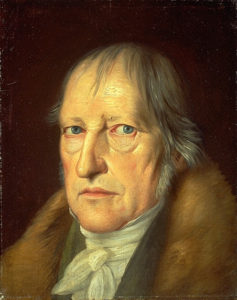What Good Is History?
All humans want to connect the dots. We want to explain why something happened – or will happen — by linking events through time. A caused B caused C and that will cause D. When we do this in the past, we call it history. When we project it into the future, we call it politics.
We want to connect the dots because we deeply desire a sense of control. If we can explain why something happened in the past, we believe that we can control it in the future. If X causes Y and we don’t want Y to happen again in the future, then we can work very hard to eliminate X. We can control the future because we can explain the past in mechanistic terms.
The past, however, is a very rich source of causes and effects. It may be that X causes Y in some circumstances. In other cases, perhaps P causes Y. In still other cases, the combination of X, P, and Z causes Y – but only if X, P, and Z occur in a certain order. If we look hard enough, we can use history to prove anything we want. Liberal historians find liberal causes. Conservative historians find conservative causes. To paraphrase Ernest Rutherford, this isn’t physics, it’s stamp collecting. One side collects red stamps; the other side collects blue stamps.
We often underestimate the role of chance in the shaping of events. As Hans Zinsser pointed out in Rats, Lice, and History, a lot of stuff happens by accident and stupidity. The right person is in the right place at the right time and we have a victory. The right person is not in the right place at the right time and we have a tragedy. Stuff happens for no apparent reason.
Yet we still have a need for control. So we make stuff up. The fancy term for this is confabulation. Wikipedia defines confabulation as a “memory error defined as the production of fabricated, distorted, or misinterpreted memories about oneself or the world, without the conscious intention to deceive.” It’s not a lie; it’s an illusion.
We used to think that confabulation was a sign of mental illness. Today, we believe that every human does it. It’s a simple way to deal with a reality that we can’t explain or control.
The French philosopher, Henri Bergson, developed the related idea of “retrospective illusion”. As we “…consider our actions in the past, we have the illusion that they could not have developed in any other way. At the moment, however, our actions seem indeterminate.” We see the past as an eternal chain of causes and effects that could not have happened in any other way. According to Bergson, it’s an illusion. We see the path of history clearly. What we don’t see is how it might have lurched in a different direction because of some random event. (Bergson’s concept is also known as retrospective determinism).
Even the best histories by the best thinkers must necessarily omit most of reality. As Mark Twain wrote, ““In the real world, the right thing never happens in the right place and the right time. It is the job of journalists and historians to make it appear that it has.” We simplify the real world so we can comprehend it and control it. As we simplify, we also make mistakes. Perhaps Hegel (pictured) was right: “History teaches us nothing except that it teaches us nothing.”
Let’s Make Better Mistakes Tomorrow

History teaches us nothing.
What does it mean when the entire country is talking in the past tense? For me, it means I’m worried and dispirited.
As the Greeks taught us, arguments in the past tense are about blame. We’re trying to find out who did what, when, and how. That’s important in a judicial process when we’re trying to assess guilt or innocence. Otherwise, I’m convinced that arguing in the past tense is useless. We learn nothing. We solve nothing. We change nothing.
Politicians, of course, are eager to lay blame. Blame leads to anger and anger leads to votes. It works and has always worked, so politicians will never change the basic formula – blame the other guy, fire up the base, and garner some votes. It’s not about logic or even hope for the future. It’s about pandering and identity.
Some people argue that we can learn important lessons from the past. I’m wondering when that will happen. We make the same mistakes over and over. The mere fact that we think we’ve learned lessons from the past may actually make us more dangerous. We think we’re all the wiser; we couldn’t possibly make those mistakes again. We grow self-satisfied and egocentric. Egocentrism is the reason why every person has to make her own mistakes. We don’t realize we’re egocentric until it’s too late.
Other people argue that things happen for a reason. If we can only divine those reasons, we can understand the arc and thrust of history. But there are so many possible reasons for any given action, we can marshal evidence for virtually any argument. What caused the Civil War (or was it the War Between The States)? It was slavery. No, it was industrialization. No, it was Lincoln’s perfidy. It was the North’s fault. No, it was the South’s fault. In the end, do we really know? Are we any wiser? Perhaps we just look for the “facts” that we already believe. It’s confirmation bias writ large.
Mark Twain said it well, ““In the real world, the right thing never happens in the right place and the right time. It is the job of journalists and historians to make it appear that it has.” We can write history any way we want. We have a near infinite number of ways to interpret a story. We see this in fiction regularly. Just watch The Affair on Showtime. Or read La Maison de Rendez-Vous. Or watch Rashomon. Perhaps history is just a branch of fiction in which we use real people.
So, what’s the cure? First, let’s stop thinking about the past. Every good financial analyst will tell you not to consider sunk costs as you make decisions about future investments. Sunk costs are just that – they’re sunk. So is history. No use crying over spilt milk.
Second, let’s take a cue from design thinking. Instead of analyzing the problem, let’s analyze the solution. Let’s look forward and imagine a solution. Then let’s ask, how do we get there? It won’t work perfectly. In fact, it may not work at all. But at least it has a chance. History doesn’t. As they say, let’s make better mistakes tomorrow.
